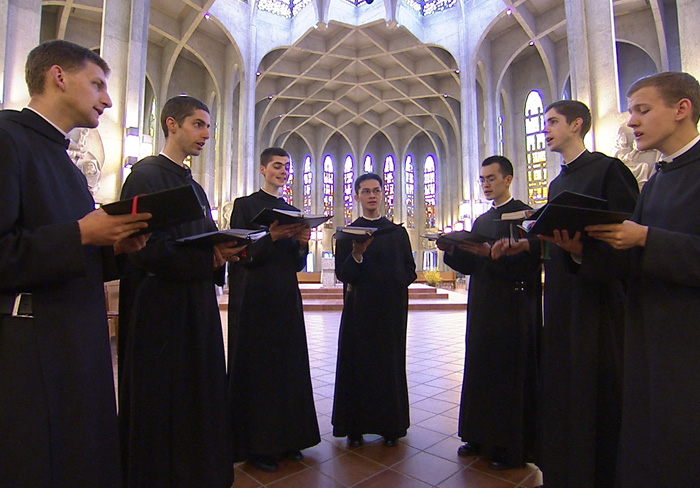In your family, who’s more joyful, mom or dad? Among your friends, who’s the most joyful? What about between me and Fr. Mario? Oh boy… I didn’t ask who’s the most joyful person we know because I’m not sure myself. It’s too vast and it’s hard to be specific.
My English teacher, Dr. Morgan, taught me that we learn by comparison. Things become more clear when we compare them. So, taking two people, not to compare their worth or goodness, but to consider their joy, and ask, “Why is my mom/dad more joyful than the other?” What can I learn from this?
It’s sad to say, but I’m aware that sometimes I’m not that joyful. I see many people who aren’t joyful. Yet I do want to be more joyful.
The antiphon today tells us twice to rejoice! The opening prayer said, “Enable us… to attain the joys of so great a salvation.” The first reading says, “I will greatly rejoice in the Lord” (Is 61:10). The second reading says, “Rejoice always… for this is the will of God… for you” (1 Thess 5:16,18). So God’s message is clear!
Now for some of us we’re born more even-keeled, more relaxed, more optimistic. Others are born more anxious, pessimistic, and see problems rather than solutions. One of the monks up at the Abbey is extremely joyful, calm, serene, and nothing ever phases him. One time I was standing outside the monastery talking to one monk, and this joyful monk drove by us on the tractor and waved and smiled. The other monk looked at me in disbelief: “He’s always so happy… It’s disgusting.”
When I thought about joyful people I know, this monk came to mind. But it’s easy for him. If you’re born joyful, God bless you, you’re making the world a great place. So I had to think of people I know who struggle to be joyful, to whom it doesn’t come naturally.
So I decided to call a sister I know. She told me once that she has a melancholic temperament and to this day, I still don’t believe her, but she insists (with a smile) that she is! On the phone, I asked, “Sister, how are you so joyful if you’re so melancholic?” And without hesitation she responded, “I’ve consciously worked on gratitude, looking for the good in everything. Sure, I can point out the bad—no problem. But there’s always going to be something good there. Then it’s hard not to be joyful. Even if it’s awful. And not taking myself too seriously.” She had a great novice mistress who said, “My sense of humour is going to save me.” Then Sister added, “If I have a hard time, that’s whom I call; then she gets me back on track. If I find myself immersed in melancholy, then those are the three things I check myself on, and then I have to make a conscious effort to practice those three things.”
A quick word on these three ideas:
1) Gratitude: all good things come from our Father who loves us. If we don’t recognize the gifts of life as gifts, the gifts of love, other people, family, good things, goodness itself, etc. then “we are probably destined to see life in terms of what we lack, what we do not have, or what we did not get.” There’s an expression: “I never knew a grateful person who was unhappy” (Fr. Robert Spitzer, SJ, Five Pillars of the Spiritual Life, 152). When we let ourselves be surprised by the good things God gives us, then we feel fortunate, special and taken care of.
2) That leads to the second idea: looking for the good in everything. When we face challenges, “these aren’t necessarily negative; they are opportunities to develop courage, self-discipline, compassion, self-sacrifice, wisdom, care, and love” (153).
With this in mind, I called someone else: a priest-friend of mine and asked him why he’s so joyful. (Keep in mind that he’s naturally joyful. I thought he was naturally negative because he always makes fun of me for not having a cell phone.) He said he focuses on “finding the positive in things,” which he called an Americanized version of St. Paul’s famous line: “whatever is true, whatever is honourable, whatever is just, whatever is pure, whatever is lovely, whatever is gracious, if there is any excellence, if there is anything worthy of praise, think about these things” (Phil 4:8). My friend tries to sincerely identify the good in every person and affirm that because there’s always something that can be affirmed in everyone.
3) Not taking ourselves too seriously. I would say there’s a spectrum: on the one side, most people take their life, their spiritual life and prayer too lightly. On the opposite end, some people take themselves too seriously. But there’s a better way, in the middle of the spectrum, that is, to take life seriously but without excess.
 Someone once asked Pope Emeritus Benedict, “What role does humour play in the life of a pope?” He answered, “I’m not a man who constantly thinks up jokes. But I think it’s very important to be able to see the funny side of life and its joyful dimension and not to take everything too tragically. I’d also say it’s necessary for my ministry.” So take life seriously indeed! There’s no real joy in treating life lightly or frivolously. But be careful of taking ourselves too seriously.
Someone once asked Pope Emeritus Benedict, “What role does humour play in the life of a pope?” He answered, “I’m not a man who constantly thinks up jokes. But I think it’s very important to be able to see the funny side of life and its joyful dimension and not to take everything too tragically. I’d also say it’s necessary for my ministry.” So take life seriously indeed! There’s no real joy in treating life lightly or frivolously. But be careful of taking ourselves too seriously.
One of my friends has a huge family and works at the same time. With so much going on she does her best to be a great mom. But one time her young son swallowed a penny! The next day he went up to her and whispered, “It came out.” Her response, a combination of exasperation and humour, was, “Father, all I can do is laugh.” It wasn’t neglect. She was being wise and trying to avoid getting overwhelmed by the craziness of it all.
For me, Sister’s advice is brilliant. I try to reflect on these things and list things which I’m grateful for. It’s a conscious effort. And let me just recommend going to the penitential service because there’s no joy when we feel guilty.
So, who would be more joyful: a mom/dad who’s grateful or ungrateful, sees the good or sees the bad, who takes life seriously or too seriously?



